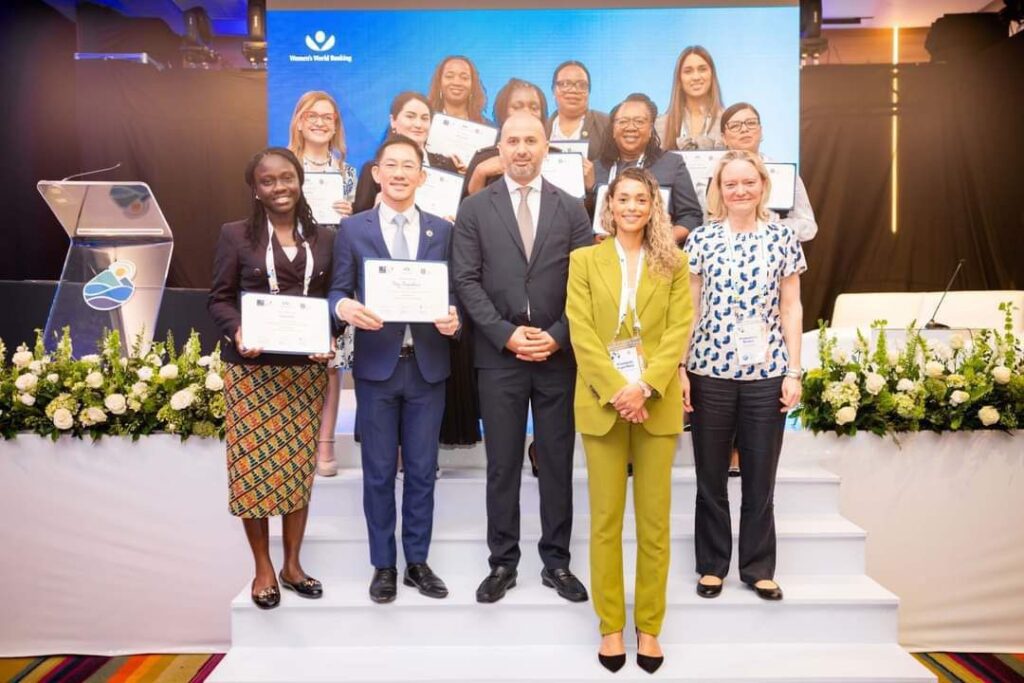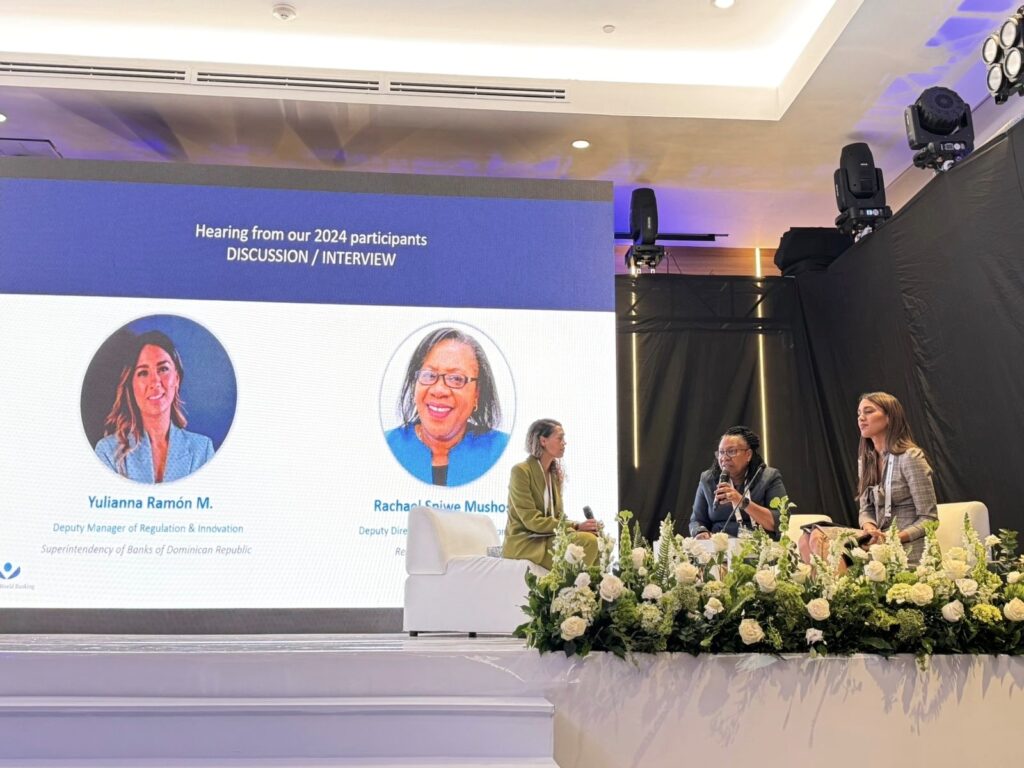The 2024 Alliance for Monetary Inclusion (AFI) International Coverage Discussion board, held in El Salvador between 2 – 5 September, was per week of wealthy dialogue and collaboration. The spotlight of the occasion for Ladies’s World Banking, was the Management & Range Program for Regulators (LDR) commencement ceremony on the morning of three September, a second that showcased the arduous work and dedication of our individuals and the numerous potential for future gender numerous management in monetary regulation.

From left to proper again row: Inés Paez – Superintendency of Banks of Dominican Republic, Adolat Sharipova – Nationwide Financial institution of Tajikistan, Jean Couvaras-Kamanga – Financial institution of Zambia, Locadia Chaavure – Reserve Financial institution of Zimbabwe, Shirley Middleton – Workplace of Supervisor of Insurance coverage and Non-public Pensions, Belize, Rachael Spiwe Mushosho – Reserve Financial institution of Zimbabwe, Yulianna Ramόn – Superintendency of Banks of Dominican Republic , Arifah Bautista – Workplace of Supervisor of Insurance coverage and Non-public Pensions, Belize
Opening Remarks from an Inspiring Chief
The commencement kicked off with an impactful keynote tackle from Deputy Governor, Felicia Dlamini Kunene, from the Central Financial institution of Eswatini and a proud alumna of the LDR program. DG Kunene’s remarks resonated deeply with the viewers, as she highlighted the crucial significance of gender-inclusive insurance policies in monetary regulation and their broader affect on economies.
Felicia Dlamini Kunene emphasised that monetary inclusion shouldn’t be a zero-sum sport; empowering ladies to take part in monetary techniques doesn’t detract from males’s roles. Relatively, it’s about guaranteeing that every one segments of society can contribute to financial progress. A poignant second in her speech was when she shared Eswatini’s journey towards incorporating ladies’s monetary inclusion (WFI) explicitly into their nationwide technique. Whereas authorized boundaries to land possession for girls have been eliminated in 2005, conventional and social buildings stay a problem, underlining the significance of monetary, financial, and authorized literacy for girls. “If we exclude ladies from the monetary system,” she acknowledged, “we stifle not solely their growth but in addition the event of our international locations.”
Her name to intentionally deal with gender in monetary insurance policies was an empowering reminder of how focused initiatives can speed up progress. However she additionally underscored the necessity for multi-sectoral approaches that contain males, and take into account social and cultural points alongside monetary coverage.
Capstone Shows: Insights & Improvements
This system continued with capstone displays from taking part establishments within the 2024 LDR cohort. Every challenge centered on advancing ladies’s monetary inclusion or management, highlighting the varied methods being deployed throughout completely different international locations.
- The Financial institution of Zambia explored methods to bridge the hole between formal monetary service suppliers (FSPs) and casual financial savings teams (ISGs), that are favored by ladies. With practically 800,000 Zambian ladies concerned in ISGs, there’s a vital alternative to formalize these networks to enhance entry to capital and scale back predatory lending practices.
- The Nationwide Financial institution of Tajikistan offered their nationwide technique to assist women-led MSMEs, anticipating that just about 30% of women-owned companies will profit from initiatives akin to decrease rates of interest and simplified mortgage documentation. Their efforts to boost ladies’s entry to finance underscore Tajikistan’s dedication to gender equality in entrepreneurship.
- The Reserve Financial institution of Zimbabwe shared its imaginative and prescient for constructing a pipeline of ladies leaders inside each the central financial institution and the broader monetary sector. They famous that whereas 83% of ladies now have entry to monetary providers, utilization stays low. Rising the variety of ladies in management roles is seen as key to designing merchandise that higher meet ladies’s wants – a idea we hope to see confirmed sooner or later by their efficiency indicators.
- The Superintendency of Banks of the Dominican Republic outlined their efforts to shut the gender hole in monetary inclusion, which has widened in recent times. Their technique makes use of behavioural economics instruments, publicly sharing efficiency of banks and creating competitors to encourage FSPs to supply extra gender-conscious merchandise. They intention to extend ladies’s participation within the monetary system by 5%, reaching an extra 175,000 ladies by 2025.
- The Nationwide Insurance coverage Fee of Ghana shared their plan to mandate a minimal of two ladies on insurance coverage firm boards by 2030. The coverage, which is within the type of a Directive is tied to the Insurance coverage Rules which is at present laid earlier than Parliament. Enforcement is predicted to start by June 2025, with full implementation by 2030.
- The Workplace of the Supervisor of Insurance coverage and Non-public Pensions, Belize, offered their initiative to enhance monetary literacy amongst women-led MSMEs, with a specific deal with insurance coverage. The challenge has already been revised by way of a sequence of roadshows, permitting for higher collaboration with the Central Financial institution of Belize and different authorities entities. This expanded the scope to broader MSME assist past insurance coverage, with the objective of reaching 5% progress in small women-led MSME ownerships.
These capstone tasks exemplified the LDR program’s function in fostering innovation, collaboration, and gender-focused reforms inside monetary establishments. We’re excited to listen to concerning the work and alter they’re planning for the ladies of their international locations and the affect they anticipate to have.

Reflections from the 2024 Cohort
Throughout a particular interview session, we heard from Yulianna Ramόn, Deputy Supervisor of Regulation and Innovation, and Rachael Mushosho, Deputy Director for NFIS and Micro Finance Establishments, who each shared their private journeys on the LDR program. Yulianna, motivated by the credibility and international fame of the LDR program’s companions, spoke of her heightened conviction to drive purposeful change.
“Once you need to have an effect, you could be intentional,” she mentioned. “Issues gained’t change if we simply anticipate them to take due course.”
She inspired her friends to be multipliers of revolutionary concepts, driving change throughout their organizations.
Rachael echoed this sentiment, discussing the significance of mindset in reaching targets. She acknowledged that the journey towards gender parity in monetary management is usually met with resistance however emphasised the necessity to deal with the last word objective reasonably than the obstacles. She additionally identified the danger of mismatch between coverage implementation and follow, noting that change usually requires male counterparts to know and assist gender equality initiatives and highlighted the significance of embedding these practises in order that coverage ‘stands the take a look at of time’.
Wanting Forward
Because the occasion got here to an in depth, the 2024 LDR commencement was a robust testomony to this system’s success in nurturing numerous management. The passion and willpower of the cohort, paired with the tangible outcomes of their tasks, sign a future the place gender equality in monetary regulation shouldn’t be solely attainable however inevitable.
The commencement was not only a ceremony—it was a name to motion for all concerned to proceed pushing boundaries, driving inclusive insurance policies, and championing the management of ladies in monetary regulation throughout the globe.
A particular thanks goes to our program funders, the Swiss State Secretariat for Financial Affairs (SECO) and Visa Basis for making this program attainable.



